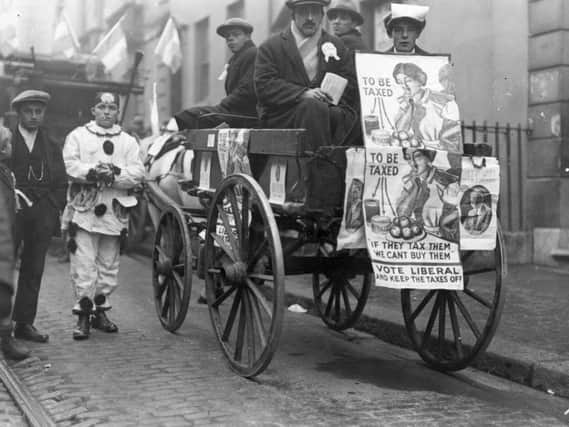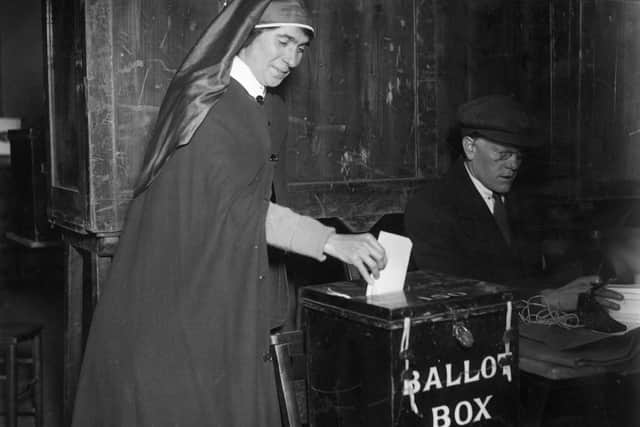What happened the last time there was a general election in December - we look back at events from 1923


The volcano, which looms over the Italian city of Naples and famously destroyed the ancient city of Pompeii, began erupting again during the first week of December in 1923.It might have been seen by some as a portent of the political rumblings already being felt in a Europe that was increasingly ill at ease.In Britain, voters had their Christmas shopping interrupted having been asked to head to the polls. At the time, Conservative prime minister Stanley Baldwin was seeking to strengthen his grip on the leadership of his party, and 96 years later there is a sense of déjà vu as Boris Johnson looks to win a Tory majority.In this sense, Johnson will be hoping to fare better than Baldwin. The election itself was a strange, though significant, affair, as it turned out. What is particularly interesting about the 1923 election is that it didn’t need to be called. Baldwin had taken over at Number 10 in May that year after the ailing Andrew Bonar Law resigned, suffering from throat cancer. The Conservative Party had a comfortable majority in the House of Commons and Baldwin could have conceivably waited another four years before facing an election.However, like today, the political landscape was fractured. It was a little over five years since the guns had stopped on the Western Front, and the nation was still struggling to come to terms with dreadful legacy of the Great War.
Advertisement
Hide AdAdvertisement
Hide Ad“The No More War movement was very powerful at the time, particularly in the Labour Party,” says Keith Laybourn, Professor Emeritus of the University of Huddersfield.The political status quo was changing, too. The Tories were in a state of flux and the Liberals were struggling to establish a new identity in a rapidly changing world. On top of all this was a Labour Party on the rise.Post-war gloom was hanging over Britain, with high unemployment and industrial unrest crippling parts of the country, and if Brexit is the subtext of the 2019 General Election, then for Baldwin it was protectionism.He called an election in November to seek support for introducing trade tariffs on imported goods. “The Tory Party was deeply divided at the time and one thing to bring them back together was protectionism. What Baldwin was trying to do was to reunite the party,” says Prof Laybourn.It was a precursor to what became ‘‘one nation Toryism’’. “He had this idea of ‘Englishness’ based around fair mindedness and reason, and an Arcadian England that never really existed.”The Liberals, too, were riven by disagreement. They had effectively become two parties with David Lloyd George on one side and Herbert Asquith on the other. There was a great deal at stake. What happened in the UK mattered in those days and the world was watching as the British government sought to enforce a protectionist policy. William Thomas Morgan, writing in the American Political Science Review, in 1924, said: “Not only were the results of the British national election of last December momentous for the British people themselves, but it may be doubted whether any other election in the country’s history ever excited as much interest in foreign lands.”


The same could be said of Brexit Britain as the nation heads to the polls next week.On December 6, 1923, a reportedly mild and dry day, the country voted with a turnout of around 70 per cent – just three per cent down on the figure for the previous year’s general election.“Baldwin went to the electorate on the basis of protectionism, but Labour and the Liberals came together to stop this,” says Prof Laybourn. “Labour stood down in around 20 seats to let the Liberals win. There wasn’t an official national policy it was more a case of local agreements, a quid pro quo.”The electorate itself now had now changed. Thanks to the Representation of People Act, which gave partial suffrage to women, roughly 8.5 million women were eligible the vote. However, it’s worth noting that 60 per cent of women still didn’t have the right to vote, the majority of which were younger, working class women.“This was the beginning of a new democratic age in this country,” says Prof Laybourn. “Before 1918, around seven million people had the vote, but by 1929 it was 27 or 28 million.”General elections, though far from slick by today’s standards, were becoming more professional. “By 1923 the main parties put more focus on their manifestos. Previously they were just two or three pages and now they had become more detailed leaflets.”Even so, there was no round-the-clock TV coverage or swift exit polls predicting the outcome that we see today and the results could take several days to come though. When the results did come through in 1923 they sent shock waves around the country. The Tories remained the largest single party with 258 seats, but had seen their majority wiped away and the country was left with a hung parliament.
Advertisement
Hide AdAdvertisement
Hide AdBaldwin attempted to continue to lead the country, but when the Liberals and Labour combined to vote down his King’s Speech his government inevitably fell.“Stanley Baldwin wrote later that it was a democratic experiment and that it might go wrong. He was concerned about populism and that people might fight and win on one issue without seeing the full picture. And some of those concerns redolent then are still redolent today.”In 1923, Europe was entering a period of turmoil. The previous year, Benito Mussolini’s march on Rome saw him sweep to power, and just a month before the UK’s December election, an abortive attempt to start an insurrection in Germany against the Weimar Republic was crushed. The so-called Beer Hall Putsch failed, but it wasn’t the last we heard of its ringleader – a certain former Austrian corporal. “With the rise of Mussolini we see the beginnings of the fascist movement developing in Europe,” adds Prof Laybourn.In January 1924, Ramsay MacDonald became the first Labour prime minister. He lasted until October the same year when another general election returned the Conservatives to power. After Labour’s election victory, George V was quoted as saying: “I wonder what grandma-ma would have thought of a Labour government.” His grandmother, of course, was Queen Victoria. In the two decades since her death the country, and indeed the world, had changed dramatically. No one knew what the future held, but in the wake of the last December general election there was frustration, uncertainty and no small amount of apprehension in the air.